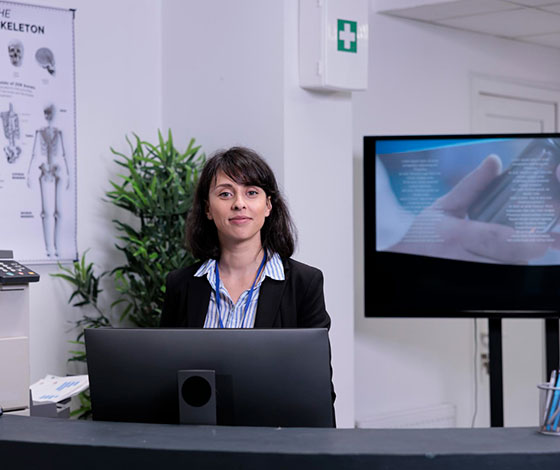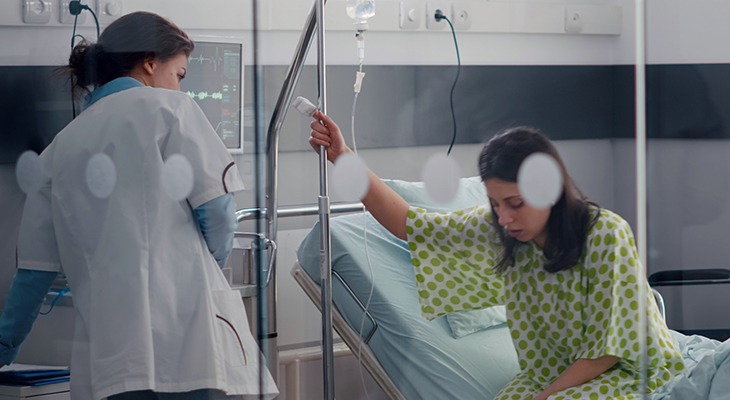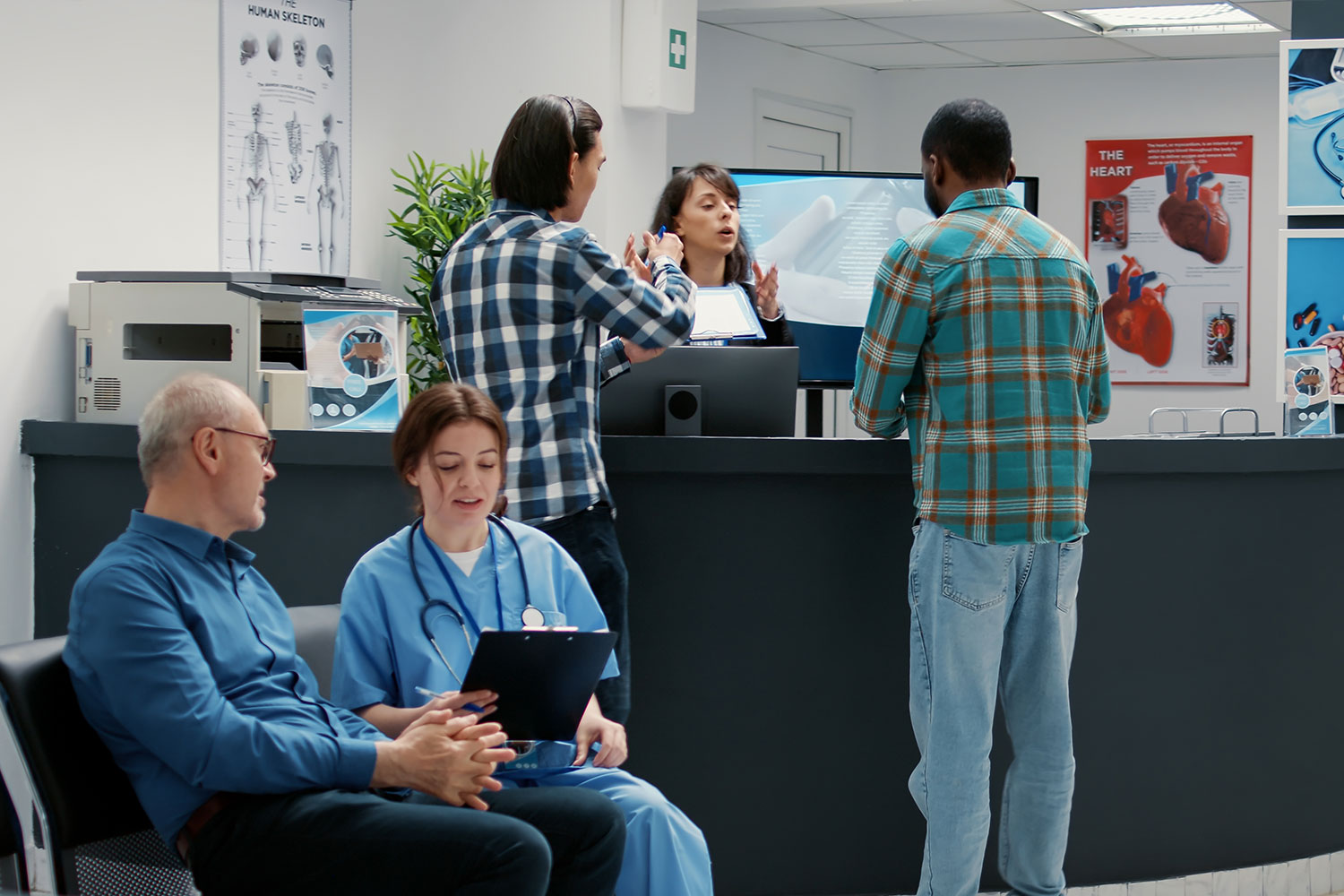
Admission Process
The front office staff at the reception will assist you during the admissions process. They will generate a unique health identification (UHID) number for the patient, and all the medical records will be maintained and stored by the hospital for all future references. They will also explain the total estimate to you and guide you in selecting the relevant category of room.
In addition, you will be required to make an advance payment. The advance shall be adjusted against the final bill at the time of discharge. Those seeking the cashless route would have to visit the insurance desk or TPA desk for the hospitalisation of the patient. The staff will escort the patient to the allotted room or bed.

Discharge Process
A nurse or attendant will assist you in the discharge process, which may take a few hours to complete the process. Once your final bill is generated, you are expected to clear your dues by paying cash or by credit or debit card. The nurse will hand over your discharge summary and belongings and will also explain the medications you need to continue after your discharge and any other follow-up instructions.
- When the doctor advises discharge, discharges are to be entered in the system and in the discharge process sheet
- To follow up with the doctor about writing a discharge summary and to inform the credit billing department.
- When discharged, advise the discharge brochure to be given to the patient attendant and explain it to them.
- The total process time taken for discharge is 2-4 hours. It may extend in the case of insurance.
- The case sheet to be sent for billing and pharmacy clearance should be sent to the pharmacy.
- Send original reports, medicine boxes, and stickers to the credit billing department; follow up with billing auditing and typing.
- To keep informing the patient attendant regularly in case there is a delay in the discharge process.
- Once the patient is discharged, a feedback form is given to seek his or her valuable suggestions, explaining to the patient the importance of feedback.
- In the case of planned discharges, the discharge summary is to be written one day before and kept ready.

Guidelines for Visitors
We value your family and friends and recognise that they are an important part of your recovery process.
- For the comfort of all our patients, we request that you limit your visits during visiting hours of 11 a.m. to 1 p.m. and 5 p.m. to 7 p.m.
- Please note that visitors may be restricted according to a patient’s medical condition and/or special needs.
- At the time of admission, you will be issued passes for attendants and visitors. Please request that your attendant and visitors wear or display these passes while on the hospital premises. In case of a loss of the pass, you may get in touch with the Help Desk located at the hospital's main entrance.
- Visits by children under the age of 12 are not allowed on patient floors. This is to protect children from catching any infection.
- Sanitise hands before and after visiting.
No spitting or smoking inside the campus premises.
Outside food and beverages are not allowed inside campus premises.
- • Use of mobile phones is prohibited where critical medical equipment and patient monitoring systems are in operation.
Patient rights & Responsibilities
Patient Rights
- Patient and family rights include respecting values and beliefs, any special preferences, cultural needs, and responding to requests for spiritual needs.
- Patient and family rights include respect for personal dignity and privacy during examinations, procedures, and treatment.
- To access your clinical records
- Patient and family rights include protection from neglect or abuse.
- Patient and family rights include treating patient information as confidential.
- Patient and family rights include the refusal of treatment.
- Patient and family rights include a right to seek an additional opinion regarding clinical care.
- Patient and family rights include informed consent before the transfusion of blood and blood components, anaesthesia, surgery, the initiation of any research protocol, and any other invasive or high-risk procedures or treatments.
- Patient and family rights include a right to complain and information on how to voice a complaint.
- Patient and family rights include information on the expected cost of the treatment.
- Patient and family rights include access to their clinical records.
- Patient and family rights include information on the name of the treating doctor, their care plan, progress, and information on their health care needs.
- Patient and family rights include determining what information regarding their care will be provided to themselves and their families.
Patients Responsibilities
- Provide complete and accurate information about his or her health, including his or her present condition, past illnesses, hospitalisations, medications, and any other matters that pertain to his or her health.
- Provide complete and accurate information, including your full name, address, and other information.
- To ask questions when he or she does not understand what the doctor or other member of the healthcare team says about a diagnosis or treatment.
- Abide by all hospital rules and regulations.
- Comply with the no-smoking and visitors policy.
- Be considerate of noise levels, privacy, and safety. Weapons are prohibited on the premises.
- Treat hospital staff, other patients, and visitors with courtesy and respect.
- To be on time in case of appointments. To cancel or reschedule as far in advance as possible in case of cancellation or rescheduling of the appointments.
- Not to give medication prescribed for him or her to others.
- To respect that admitted patient and patients requiring emergency care, give priority to your doctor.
- To follow the prescribed treatment plan and carefully comply with the instructions given.
- To accept, where applicable, adaptations to the environment to ensure a safe and secure stay in the hospital.
- Accept the measures taken by the hospital to ensure personal privacy and confidentiality of medical records.
- Not to take any medications without the knowledge of a doctor and healthcare professionals.
- To understand the charter of rights and seek clarification, if any.
Visiting Guidelines For Intensive Care Units (ICUS)
We at Adani Hospital Mundra believe in patient and family-centred care. Adequate facilities and arrangements have been made for relatives and friends visiting the patient.
Visiting Hours
- Visitors will be allowed only during the visiting hours.
- ICU hours: 5 P.M.– 7 P.M.
- ICU hours: 11 A.M.– 12 p.M. And 5 P.M.– 6 p.M.
Amenities
- Visitor’s Lounge: The waiting area is located on the second floor.
- The cafeteria is located on the ground floor.
Timings
- Breakfast: 7:30 A.M. to 9:30 A.M.
- Lunch: 12:30 P.M. to 2 P.M.
- Snacks and tea: 4 P.M. to 5 P.M.
- Dinner: 8 P.M. to 9:30 P.M.
- Parking is available on a first-come, first-served basis.
Do’s & Don'ts
- Please keep noise to a minimum to avoid inconvenience to other patients and relatives.
- Visitor’s Lounges are for the use of multiple visitors; please be respectful of others while using these spaces.
- In the interest of the patient's health, do not visit with an infectious disease, such as a cold or flu. We encourage you to use hand sanitizer or wash your hands often to keep your family safe.
- Children under 12 years of age are not allowed to visit the patient.
- Flowers and outside food are not permitted to control infection.
- Cell phones are prohibited in some areas. Ask your nurse if you have questions about using your cell phone.

 Find a Doctor
Find a Doctor Book Health Check
Book Health Check Book an Appointment
Book an Appointment